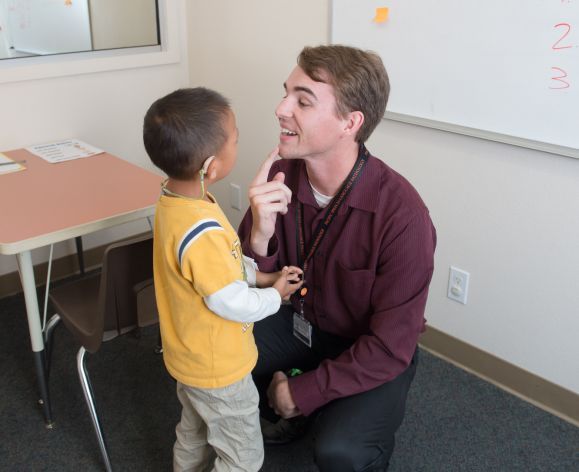How a Speech Pathologist Can Help Improve Communication Skills
Effective communication is a cornerstone of personal and professional success, yet numerous individuals face challenges that prevent their capacity to share themselves plainly. A speech pathologist is outfitted to deal with these barriers through targeted analysis and treatment approaches customized to every individual's demands. By using evidence-based restorative methods, they not only function to boost speech and language conditions however also enhance overall communicative competence. Recognizing the diverse role of a speech pathologist discloses just how their know-how can transform lives, inviting a more detailed exam of the certain techniques and outcomes related to their method.
Comprehending Communication Conditions
Understanding interaction disorders is necessary for recognizing just how they influence people' capability to share themselves and engage with others. Interaction disorders include a variety of troubles that impact speech, language, and social communication, typically preventing effective communication. These problems can arise from different variables, including neurological problems, developmental hold-ups, physical problems, or psychological problems.
Speech problems might manifest as problems in voice, expression, or fluency production, impacting exactly how words are obvious or spoken. Language disorders, on the various other hand, entail obstacles in understanding or using language, which can hinder both non-verbal and spoken interaction. Social interaction problems are characterized by problems in the pragmatic aspects of communication, such as taking turns in conversation or understanding social hints.
The effects of interaction disorders are profound, affecting not only the individual's capability to communicate ideas and feelings yet additionally their social partnerships, educational opportunities, and overall quality of life. Awareness of these disorders can foster compassion and assistance, urging reliable techniques for interaction and involvement. Recognizing the complexities of communication disorders is an important step towards promoting inclusivity and addressing the needs of those influenced.
Duty of a Speech Pathologist
Speech pathologists often play an essential role in diagnosing and dealing with interaction problems, using an array of evidence-based methods tailored per person's requirements. These professionals function with people throughout the life-span, from kids with speech delays to grownups recuperating from strokes or terrible mind injuries. Their experience includes a variety of communication issues, consisting of articulation, language, voice, and fluency conditions.
In therapeutic setups, speech pathologists utilize organized interventions developed to enhance communication abilities. They may carry out techniques such as speech workouts, language games, and social interaction training to assist in enhancements in meaningful and receptive language capabilities. Speech Pathologist. In addition, they inform customers and their families regarding effective interaction techniques and adaptive approaches to navigate daily communications
Beyond direct treatment, speech pathologists work together with other health care specialists, educators, and caretakers to guarantee an extensive technique to therapy. They advocate for clients by supplying sources and assistance, making it possible for individuals to achieve their interaction goals and improve their overall lifestyle. As specialists in the area, speech pathologists are essential in fostering efficient communication, advertising independence, and enhancing social involvement for those with communication difficulties.
Evaluation and Medical Diagnosis Refine
The evaluation and medical diagnosis procedure conducted by speech pathologists generally involves an extensive assessment to determine communication conditions accurately. This process begins with a thorough medical history, where the medical professional collects significant details concerning the person's clinical, academic, and developmental background. Understanding the context of the individual's interaction troubles is necessary for a precise diagnosis.
Adhering to the medical history, speech pathologists use informal assessments and standard examinations to review different elements of communication, consisting of speech noise production, language understanding, meaningful language, and social communication abilities. These evaluations are tailored to the person's age and certain issues, providing valuable information for analysis.
Monitoring is likewise a critical part of the evaluation procedure, as it enables the clinician to see direct how the specific interacts in all-natural settings. Additionally, best site interviews with relative and educators can give understanding into the person's communication challenges across different settings.
When the evaluation is total, the speech pathologist synthesizes the findings to figure out a diagnosis and suggest appropriate interventions. This thorough evaluation procedure guarantees that people receive targeted assistance customized to their distinct interaction demands, laying the foundation for reliable therapeutic techniques.
Therapeutic Methods and Approaches
Various restorative strategies and techniques are utilized by click for info speech pathologists to resolve a variety of communication conditions efficiently. One extensively utilized method is articulation treatment, which concentrates on correcting speech sounds with repeating and visual hints. This method is especially valuable for individuals with speech sound disorders.
One more efficient method is language intervention, which improves both meaningful and responsive language abilities. This might entail interactive tasks that advertise vocabulary growth, syntax understanding, and conversational abilities. In addition, speech pathologists usually make use of social abilities educating to boost practical language capacities, making it possible for individuals to navigate social interactions much more effectively.
Fluency shaping and stuttering adjustment techniques are specifically designed to assist those experiencing fluency disorders. These approaches help clients create smoother additional reading speech patterns and take care of the physical and psychological elements of stuttering.
Furthermore, augmentative and alternate interaction (AAC) systems are employed for individuals with severe interaction disabilities. These systems, which can include gestures, icons, or digital gadgets, supply necessary support for effective interaction.
Advantages of Speech Therapy

Additionally, speech treatment can help in developing essential listening and understanding skills, cultivating better communication in discussions. Individuals with cognitive-communication disorders can additionally profit, as treatment concentrates on enhancing memory and problem-solving capacities, crucial for efficient communication.
An additional essential element is the emotional assistance offered throughout therapy sessions. Speech pathologists develop a risk-free environment, motivating clients to overcome anxiousness and irritation related to their interaction problems. This assistance can bring about enhanced self-esteem and total mental health.
Furthermore, very early intervention via speech therapy can protect against additional difficulties, making certain that individuals reach their complete communicative potential. On the whole, the benefits of speech treatment extend beyond plain speech enhancement, favorably impacting different measurements of life for those impacted by communication problems.
Verdict
In recap, speech pathologists play an important duty in dealing with interaction conditions with analysis, medical diagnosis, and tailored healing treatments. By using evidence-based techniques, these experts boost individuals' speech and language abilities, fostering improved clearness, fluency, and social communication abilities. The benefits of early intervention highlight the relevance of seeking support from speech pathologists, as their expertise can dramatically enhance communicative capacity, eventually bring about better success in both personal and professional balls.

Speech pathologists regularly play an important function in treating and detecting interaction problems, employing a variety of evidence-based methods customized to each individual's requirements. As professionals in the area, speech pathologists are important in promoting reliable interaction, advertising independence, and improving social engagement for those with communication difficulties.

Comments on “The Role of a Speech Pathologist in Managing Speech Impairments”